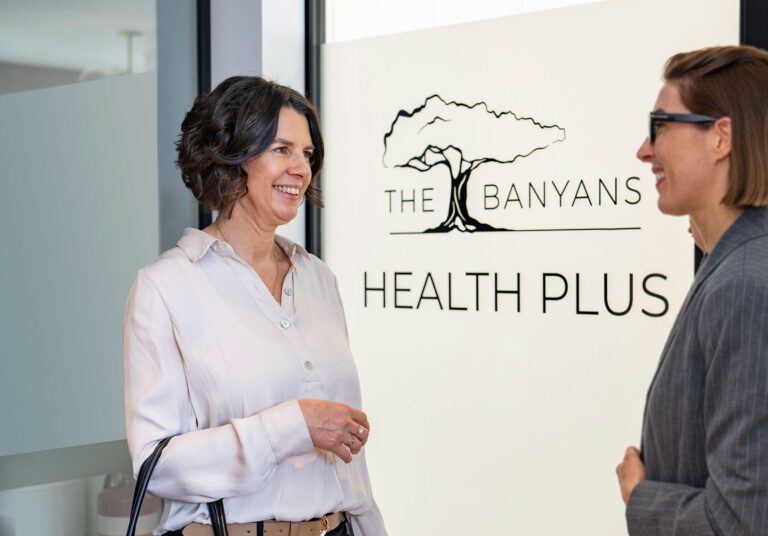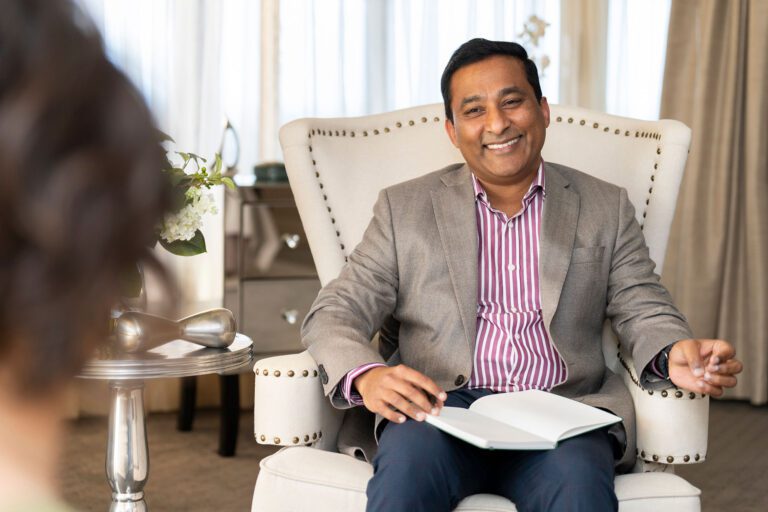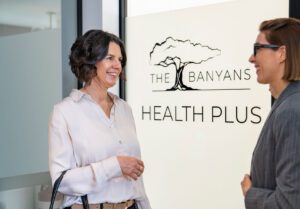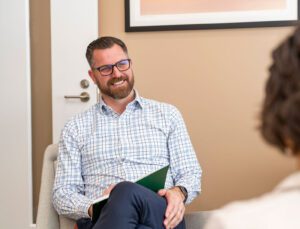
Many drug addictions and dependencies often develop as an attempt to self-medicate physical and psychological pain and distress.
These methods of coping can develop into compulsive, harmful behaviours of drug use with very serious physical and mental health consequences. Both prescription medication and illicit drug addictions can be fatal if left unmanaged.
Both prescription medication misuse and abuse and illicit drug use stem from a wide variety of causes, many of which are rooted in physical, emotional, and/or psychological pain. Drug misuse and dependency can have devastating consequences on your health and wellbeing. Evidence-based psychological therapies address foundational drivers of a person’s experience with drug misuse and encourage guests to understand the personal, social and cultural contributors underpinning their addictive behaviour.
Physical Signs & Symptoms of Drug Addiction
Although each individual responds to drugs in a unique way, there are some common features to drug addiction or dependency that separate the condition from recreational or social use. These include experiencing a drug dependency or addiction may describe feeling “strange” when the drug wears off; “withdrawal symptoms” may include shakiness, sweats, shortness of breath and more. The body may also develop a tolerance to the substance, in which more of the drug is required for the effects to be noticeable and for withdrawal symptoms to subside.
Behavioural Signs & Symptoms of Drug Addiction
Drug addiction or dependence to either illicit or prescription medication can also be characterised by secretive behaviours. Individuals experiencing a drug addiction or dependence will spend a great deal of time thinking about drugs and may lie to family, friends, doctors and pharmacists about their drug-related behaviours.
The most common forms of abused medications are those designed for legitimate short-term use following surgery (analgesics), trauma (anxiety medications) or sleeping difficulties (sedatives). Illicit drug use often begins as recreational or social use, before developing into a serious dependency or addiction.
Drug Classifications
Depressants
Depressant medications and drugs slow an individual’s nervous system, impacting their coordination and concentration. Many of these drugs are taken to relieve anxiety, encourage drowsiness, relaxation, decreased inhibition and sleep. There are both prescription and illicit depressants, including alcohol, benzodiazepines (such as Valium or Xanax), opioids (such as fentanyl, heroin or methadone), and cannabis.
Stimulants
Stimulants have an opposite effect to depressants; accelerating physical function, energy and awareness. Many people describe a euphoric effect. These types of drugs include nicotine, amphetamines (ice or speed), cocaine, ecstasy (MDMA), and Ritalin (Methylphenidate).
Hallucinogens
These kinds of drugs alter the perception of reality, and can have a huge variety of physical and emotional effects, ranging from feeling happy or relaxed to experiencing significant confusion and nausea. These drugs include marijuana, ketamine and LSD. Moreover, some people experience ‘bad trips’, in which their hallucinations can be quite disturbing and distressing.
Analgesics
The most commonly misused prescription medications are analgesics, or those given for short-term pain relief. These include oxycodone (such as Endone), morphine, codeine and fentanyl. Some people may find themselves ‘doctor shopping’ in order to obtain new prescriptions, or higher dosages. Many of these high intensity analgesics have calming effects.
Seeking Drug Addiction Help
Drug addiction and dependency can have devastating consequences on your health and wellbeing. The Banyans highly experienced team are able to tailor programs to address underlying contributors of drug misuse and achieve long-lasting recovery.

PROGRAM BENEFITS
- Safe and thorough support from a highly-qualified team of medical professionals, including Addiction Medicine Specialist, General Practitioners, onsite Psychiatrist and onsite Registered Nurses
- Regular sessions with multiple therapists and modalities to ensure strong therapeutic relationships and benefits, spanning psychology, nutrition and physical exercise
- Advanced genetic testing underlies individually designed nutritional plans based on deficiencies, intolerances and preferences
Medical Support: Addiction Medicine Specialist
Guests experiencing prescription or illicit drug dependency benefit greatly from the expertise of The Banyans Addiction Medicine Specialists. Regular reviews with your Addiction Medicine Specialist and a team of onsite registered nurses offer exceptional medical supervision, pharmacological relapse prevention, and guidance in recovery. This thorough support ensures safety and long-term improvements.
Psychiatry
Together with your Addiction Medicine Specialist, your psychiatrist will conduct a full medication review where required, guiding guests medically throughout the program. Weekly psychiatry consultations closely monitor medications for efficacy, potential side effects, and diagnosis of other co-occurring mental health conditions. Onsite registered nurses also assist in the management of medications.
THE BANYANS
Therapies for Drug Addiction
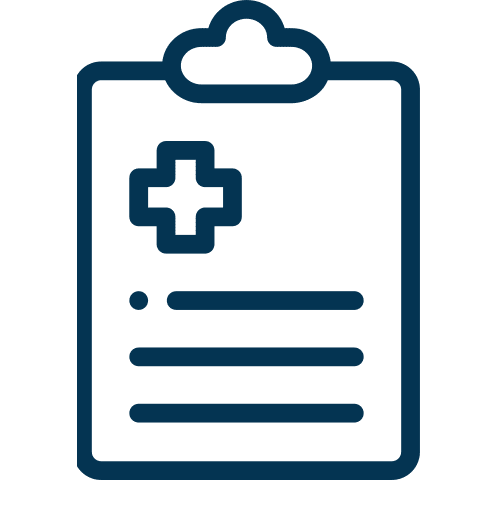
Medical Support
Regular consultations with Addiction Medicine Physicians, Psychiatrists, General Practitioners & Registered Nurses.

Psychological Therapies
Regular psychological therapy with degree-qualified professionals to address underlying causes of your experience.

Emotional Therapies
Engage in evidence-based & emerging therapies, including equine-assisted therapy, art therapy & neurologic music therapy.

Physical Therapies
Tailored sessions with your exercise physiologist and yoga therapist, and swim in our infinity magnesium pool.

Nutritional Therapies
Personalised nutrition plan and supplement regime developed by a qualified nutritionist & based on advanced testing.
Have questions? Talk to our expert team
The Banyans' Difference
Providing health and medical excellence.
Learn About Us
See what The Banyans does
CASE STUDY
Doug’s Drug Addiction Recovery
After battling an ice addiction for ten years, Doug, thirty, engaged in a residential addiction rehab program with The Banyans. Three years later, Doug says his life today is incomparable. This is Doug’s story.
“I had an ice addiction for ten years. I was lost and thought there was no hope for me at all. Now every single day I wake up is a joy. I’m free. I’ve got a beautiful family. My life now, compared with three years ago, is incomparable”
DOUG, PREVIOUS GUEST
Helpful Resources for Drug Addiction
The Banyans team have created a number of helpful resources below to assist if you think you, or a loved one, are experiencing drug addiction.
![]()
The Banyans Education Videos
At The Banyans, we have a number of videos that can help you learn more about addiction, therapy, and supporting a loved one towards improved health and wellbeing.
Transcript
Peter Hayton, Clinical Director at The Banyans: The drug and alcohol dependencies happen for a variety of reasons but I guess you could sum it down to people struggling to cope with the emotions and thoughts and stresses in life. It’s kind of like those things cloud in and it can be hard to live life when it’s like that. What we want to do is push that stuff away so we don’t have it there and alcohol helps us to push those bad things away. Of course it also destroys our life.
What we really need to do is to carry that stuff here. So that we can still have a little bit of depression or anxiety every so often. That’s an important part of life, but it helps us to get on with what other things that we need to do, that are valuable for us.
Joey, Wellness Advocate and former alcoholic: I think what led to my drinking was extremely low self-esteem combined with trauma from the past – familial and childhood dysfunction. I had a lot of issues from my childhood that I hadn’t previously dealt with but I had very very low self-worth from my early childhood, and unfortunately I turned to alcohol.
I started drinking when I was 12 and most of all I remember how it felt when I drank it: the warm comforting feeling is as it went down and I liked the way alcohol made me feel. It calmed me, made me less anxious, made me happy, jovial. When I was drunk I saw the world as being okay and being happy. I was happy, everyone else was happy, and I felt good.
Sadly it got to the stage where I needed alcohol every day to cope, and by the time I was about 16 I began experiencing withdrawal symptoms if I didn’t drink on a regular basis. My hands would shake, I’d get headaches and things like that and so I was a chronic alcoholic really before I finished high school.
And sadly as the drinking continued, my bad self-esteem continues. The drinking didn’t heal anything, it didn’t solve anything, it just made things worse, but I didn’t see it that way. At the time I just saw it as a crutch to lean on in social situations. Eventually it became a crutch to lean on when I was alone because I didn’t like being alone. I got married, I had my two children, and then finally with my addiction out of control I sought help when I was 27 years old.
[Music]
Transcript
Peter Hayton, Clinical Director at The Banyans: To help people to seek help, one of the most important aspects is recognition. Recognition of an issue or a concern regarding dependency, sometimes that’s from family members and other times it’s within the person themselves.
From there, then there’s a seeking of support services because not everybody needs the same kind of support. Most importantly, a decision to follow up.
Joey, Wellness Advocate and former alcoholic: If you think that a loved one is struggling with addiction or substance abuse, some of the signs vary.
A great deal of secrecy is one sign.
[Music]
Arguments – yeah there’s a lot of conflict. Arguments, changes in mood.
Changes in appetite – lack of appetite.
Generally a failure to participate in one’s life, so a lack of desire to be in social situations. A lot of solitary introversion is a big sign.
Some signs are more obvious than others for certain. You know, for example, some people are hanging around with the wrong crowd, making bad decisions, getting in trouble with the law things like that.
Disappearing for long periods of time with no explanation.
In my case I was hiding alcohol around my house so I would disappear to the toilet or hide in the bedroom now and again for no reason. But I was going there to drink.
Trouble with the law: for example, getting into trouble for things like drink driving and drug driving, and doing it on a regular basis. Certainly dishonesty with someone who’s been honest before, promises that aren’t kept.
[Music]
Lies – lying about drinking. “No I’ve only had one, I’ve only had two.”
Things like that. Often loved ones will find evidence of addiction around the home. For example, you know there are the more drastic things like used syringes. I’ve had things buried in gardens and things. In my case my neighbors knocking on the door and saying “Where did all those wine bottles in our wheelie bin come from?” and me having to say “I don’t know.” Alcohol hidden around the house, things like that.
Transcript
Peter Hayton, Clinical Director at The Banyans: The impact of dependence and addiction
issues on family is just as huge, as vast, but it’s very significant. Families struggle to function in any normal way. Kids struggle with their development, loved ones struggle with pain and harm because of a dependency or addiction issue. So the impact on the family unit is just huge.
It’s why it’s so important then when there is some recognition of there being concerns, that actions are taken quite quickly.
Joey, Wellness Advocate and former alcoholic: The impact of addiction on family dynamics is horrendous. In my own situation, it was really bad. There were a couple of occasions where my husband took our kids and he left the home with them, and he stayed in a motel for a night or two with them to get them away from me because he didn’t want them exposed to my drunkenness and my behavior.
Our marriage was in tatters to say the least, our relationship had all but broken down. He couldn’t communicate with me because I was always drunk. He would say things to me, we would argue. We would try to communicate and then of course I wouldn’t remember any of it when I woke up the next morning because I was so drunk. Eventually it got to the stage where communication between us ceased altogether.
My relationship with my children completely broke down because I had no bond with them anymore. My children didn’t want to come anywhere near me because I was always angry. I was always tearful, I was always pushing them away I didn’t want them anywhere near me I didn’t want them near me because I was drunk.
But I also didn’t want them near me because my self-esteem was so low, and I felt that they deserved better. I felt that they deserved a better mother. Eventually it got to the stage where I used to actually pray that I would die. I wanted to drink myself to death because I felt that my husband deserved a better wife, my kids deserved a better mother, and I just wanted to die so that my husband could go find another woman: a lovely woman, a beautiful non-drinking, charming, nice woman and that he could marry her instead. And that she could be a mother to my kids and give them the life that they deserved. That’s how low my self-esteem was, and our family was a shambles.
It got to the stage where I was dying I was slowly drinking myself to death. Then by making the decision to get better, I not only chose to get better but it was an investment. It was an investment in my own health and in my longevity. It was an investment for my family to get better.
Because when I had the naltrexone implant I was 27, so that’s given me an extra 50 or 60 years of life hasn’t it? And if I have an extra 50 or 60 years of life that means my husband and I have an extra (hopefully) 50 or 60 years of marriage, and then my children have an extra 60 or 70 years to live that they have their mother with them.
But they have their sober, healthy, loving mother with them – the mother that they deserve. My husband has the wife that he deserves. And then I live the life that I deserve. So if you add all of that together you’re looking at about 300 odd years of life. So it’s not just a choice to be healthy – it’s an investment in me and in my family, you.
Transcript
Peter Hayton, Clinical Director at The Banyans: The initial conversation is one that’s very difficult when you’re talking about a dependency or addiction issue. Sometimes it’s good to get professional help with that, and at The Banyan’s we’re always very happy to talk with family members even before they’ve spoken to their loved one, and connect them in with the kind of support that they need to be able to have that conversation the right way.
But one of the most important things is to leave judgment to the side and really focus on health and support and the way forward.
Joey, Wellness Advocate and former alcoholic: If there are family members out there who suspect that there is a person in their family in my position, if they suspect that someone is struggling with addiction, of course in this situation it has to be approached very delicately, of course.
My advice would be to approach that person with love in a non-confrontational way but with love, with hugs. You know, something I’ve never ever forgotten is the day that I received my implant I was at the clinic and there was a lovely lady who worked there and she asked me a question that nobody else had ever asked me before. She squeezed my hand and she said, “Joey, what’s the matter dear?” and I have never forgotten her.
So if you think that there is a family member or a loved one who is struggling, just squeeze their hand, put your arm around them and just say, “Hey what’s the matter?”
Everyone can get better if they make up their mind. Yeah, everyone can. None of us came into this world to suffer. I mean addiction is so debilitating, it’s degrading. No one chooses to be that way. No one would want to live that way. Every one of us came into this world to live a healthy, good, wholesome, happy life, to make a difference, and it’s there you just have to make that choice to grasp it.
[Music]
Transcript
Peter Hayton, Clinical Director at The Banyans: I guess when you think about people when they’ve come through that journey to recovery and they’ve got to that place where they’re healthy and well again, it’s just not a transformation in a person’s life but it’s everybody connected to that person: their work colleagues, you know, their business, their family, their children. It’s like there’s a new life that starts and a lot of people talk about that they talk use words like “I’ve been saved” or “it’s new” or “you know this is transformed me.” They’re powerful words, and that transformation happens across the whole family and all aspects of that person’s life.
Joey, Wellness Advocate and former alcoholic: The level of excitement felt by my husband and children was an inspiration in itself. My husband stood by me through everything. He was so supportive.
And I have to admit, he was very skeptical at the beginning. He was very nervous – he was as nervous as I was that fear of failure is ever-present, especially in the spouse and the loved ones of the addict. And that’s normal – it’s very normal for people to be skeptical. So he was nervous and he, just like me, took things one day at a time. Every day that went by was another day without alcohol and was another day that he gave himself permission to be excited. Within a few weeks he was equally excited and he was sharing in that excitement with me. Then my kids. Their personalities changed, because they were very little at the time. They were coming up to me and saying things to me, squeezing my hand and saying things like “Mum, you’re never angry anymore” and “Mum, we never see you cry anymore”.
My daughter who was who was six at the time, the bit that was the most heartbreaking thing was she looked in the fridge one night and she said, “Mummy where’s your wine?” and I had the greatest moment which was saying to her, “Mummy doesn’t drink wine anymore.” That was indescribable being able to say that to my own child: “Mummy doesn’t drink wine anymore.” And the best part I meant it. I meant it. It was so good, it was so good. It’s been almost nine years now that I have been free of alcoholism.
[Music]
Transcript
Peter Hayton, Clinical Director at The Banyans: I think one of the most important things in terms of the recovery process is to realize that everybody starts the journey of recovery with a good amount of anxiety.
Most people are apprehensive, they’re unsure and their loved ones are also unsure. But once you move through that that anxiety and that apprehension, it gives way to a new life that brings total freedom for people and their families and loved ones.
Joey, Wellness Advocate and former alcoholic: It doesn’t matter how old or young you are, you’ve got your whole life ahead of you and it can be good and it will be good if you make that decision to get better. Because addiction doesn’t discriminate and it is so important for every addict to know that they are not not worthy of treatment. Every person is worthy of treatment.
There is a brilliant beautiful life out there if you can find it in your heart to get better to just make that decision, to just take that step. It comes from within and you can’t do it for other people, you’ve got to do it for yourself.
[Music]
Transcript
Peter Hayton, Clinical Director at The Banyans: To treat the physical and the emotional symptoms is really important because if you just focus on one area, you’re not focusing on the whole person. So when we treat at The Banyan’s, when we’re treating the physical dependency, we’re looking at things like a nutrition and diet and exercise. You know, all of those things that help the person become healthy and then the emotional and psychologically content.
We’re looking at that as well with psychology, with equine therapy, with other therapy programs that help a person to adjust and retune their life.
Joey, Wellness Advocate and former alcoholic: The implant worked very very well for me because once it was inside the body it couldn’t be removed. If I had to take oral medication [oral naltrexone], I knew that I wouldn’t take it. I wouldn’t stick to it, I’d give up. So the benefit of the implant being inside the body means that it couldn’t be tampered with by me, and once it was in there it took care of the physical cravings for alcohol.
And this was very very important because once those physical cravings were taken care of, the withdrawals were taken care of, I then had the room, I had the space to focus on the emotional reasons behind my addiction and that was very very important. A lot of people think that addiction is simply about stopping the behavior and it’s not. The behavior is a symptom of a greater problem. So once I took care of the physical addiction – the cravings for alcohol – I was then able to move on to the emotional.
And I moved on to that by undergoing life coaching. All of these traumatic memories, these painful memories, all of these issues that were long buried from my childhood and bring that pain to the fore, and file it in the appropriate places and deal with it one by one and deal with those issues. To basically unpack those issues and really get to the crux of the problem as to why my self-esteem was so low and why I had this compulsion to abuse myself.
The low self-esteem, you know what I still have my days where I have low self-esteem. I’m working on it. But it is nowhere near as bad as it used to be. I actually look in the mirror now and I like the person looking back at me. Now that is a huge huge deal because when I was drinking I didn’t even look in the mirror. You know what? In the last year of my drinking I didn’t even know what I looked like – I avoided mirrors, I didn’t want to look at myself and now I do. And I’m really really proud of the person looking back at me. If there’s anyone out there who wants to get better, that will happen. You will look in the mirror and you will be proud of the person looking back at you.
Transcript
Ruth Limkin, Chief Executive Officer at The Banyans: the underlying philosophy of The Banyan’s Health and Wellness is helping people live life to the full. And we do that by helping people understand the causes behind some of the health issues and well-being issues that they’re experiencing, and help them find really great solutions for it.
Joey, Wellness Advocate and former alcoholic: Out here, you’ve got the peace, the quiet the beautiful view. You have all of this serenity which is very very important, but there is an enormous amount of care provided her: good nutrition, good support. There is a very good combination of skills here at The Banyans for assisting the recovering addict.
I have psychologists and psychiatrists, you know that the medical side of things is all here. There is so much support here, and it’s all ready so that you can just walk in and get started.
Ruth Limkin: When people walk into The Banyans Wellness Residence they walk into an environment of care, of respect and of joy, and they’re three of our core values.
What I love is hearing the feedback from people about not just how incredible the staff are, but how the whole experience has been transformative for them.
[Music]
Relevant Blog Posts
Videos | Discover The Banyans

Australia’s most exclusive rehabilitation residence
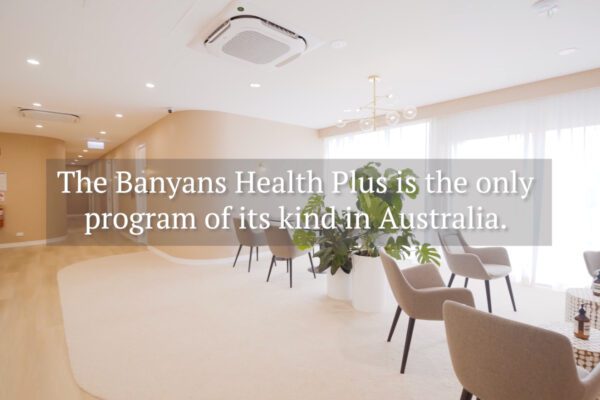
The Banyans world-class, multidisciplinary day programs

Welcome to The Banyans Health and Wellness

Rejuvenate, Reflect and Rest at The Banyans
The Next Steps
MAKE AN ENQUIRY
Make an enquiry on +61 1300 226 926 or using the form below.
TELL US YOUR STORY
Speak with our Intake Team to discuss your needs, concerns and desired program.
ASSESSMENT
Complete an Intake Assessment and secure your program.
WELCOME TO THE BANYANS
Begin your program at The Banyans Health Plus and experience exceptional treatment and outcomes-focused care.






